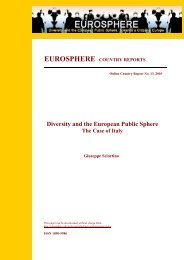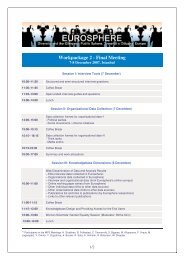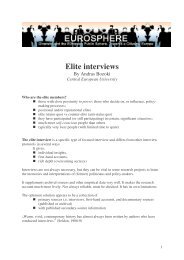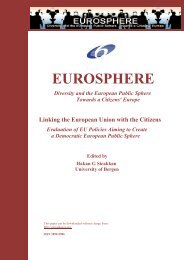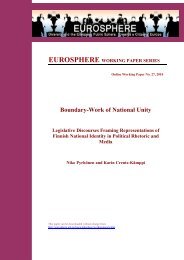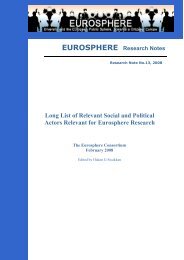Migrants, Minorities, Belongings and Citizenship. Glocalization and ...
Migrants, Minorities, Belongings and Citizenship. Glocalization and ...
Migrants, Minorities, Belongings and Citizenship. Glocalization and ...
Create successful ePaper yourself
Turn your PDF publications into a flip-book with our unique Google optimized e-Paper software.
The dimensions that Glocalmig focuses on are:<br />
Dimension 1: <strong>Belongings</strong> <strong>and</strong> identities<br />
Throughout the historical processes of state formation <strong>and</strong> nation building in Europe,<br />
citizenship evolved from being the legitimizing aspect of states’ sovereignty <strong>and</strong> political<br />
organization to serving as a tool of collective identity promotion. When successful, this<br />
led to a conception of citizenship as a belonging mode. To the existing ethnic <strong>and</strong><br />
religious forms of belonging <strong>and</strong> their essentialized spaces, these processes added the<br />
national mode of belonging <strong>and</strong> the national spaces of interaction. However, the<br />
collective identities based on such a conception of citizenship have not necessarily<br />
expressed the existing diversities within societies, something which prompted alternative<br />
modes of belonging within these structures of imagined or constructed uniformity. The<br />
national mode of belonging entered a symbiotic coexistence with the minority modes of<br />
belonging – e.g. religious, ethnic, territorial, ideological, etc. Each of these essentialized<br />
modes of belonging created their own spheres, spaces, <strong>and</strong> modes of meaning,<br />
interaction, <strong>and</strong> participation – <strong>and</strong> their combinations <strong>and</strong> permutations- both within <strong>and</strong><br />
beyond the frames of the nation states. Essentialized modes of belonging are singular<br />
forms of ethnic, religious or diasporic belongings.<br />
The forms of belonging reaching beyond the boundaries of nation states <strong>and</strong> beyond<br />
territories led to the emergence of new spaces of meaning <strong>and</strong> interaction - transnational<br />
spaces. These values serve as a basis for mobilization against the belonging frames of<br />
national states. The transnational spaces accommodate cross-border political movements<br />
based on common values that are against national belongings <strong>and</strong> boundaries. They<br />
represent cross-border social/political organizations, exclusive of territorialized modes of<br />
belonging. The transnational space is, thus, different from the versions of “transnational<br />
politics” where the traditional national references of meaning persist <strong>and</strong> constitute the<br />
basis for political action. Transnational spaces are also different from the diasporic spaces<br />
that relate to physically de-territorialized singular belongings. They are about people –<br />
<strong>and</strong> their actions <strong>and</strong> interactions – that are also psychically de-territorialized. The<br />
transnational space is a macro-space comprising transnational organizations <strong>and</strong><br />
associations with non-spatial expressions <strong>and</strong> de-territorialized symbolisms. This<br />
symbolism relates to the misalignments between citizenship <strong>and</strong> belongings,<br />
participation, <strong>and</strong> voice deficits in national <strong>and</strong> supranational contexts.<br />
Conceptualized as a gradually growing process of merging of markets <strong>and</strong> politics within<br />
<strong>and</strong> beyond the boundaries of nation states (as predicted by Jean Monnet), globalization<br />
has further affected, not to say diminished, national states’ normative, instrumental, <strong>and</strong><br />
41



